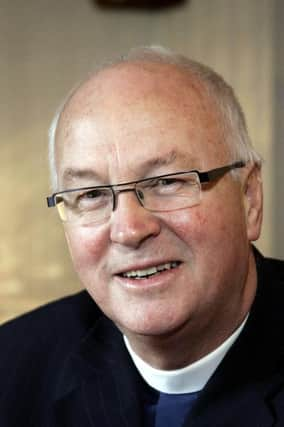Woodbine Willie at the Riverside


The play ‘Woodbine Willie, poet and padre’ will be staged at the Riverside Theatre on Thursday 9th February by members of the Searchlight Theatre company. When the play was performed at the Edinburgh Fringe Festival, it was acclaimed as a ‘play of overwhelming sincerity and honesty’ and ‘a moving and heart-warming tribute’ to ‘Woodbine Willie’, the Rev. Geoffrey Studdert Kennedy. A younger generation will have heard of him through the lyrics of ‘Divine Comedy’s song ‘Absent Friends’.
Studdert Kennedy had Irish blood in his veins, and his father had served as a curate in Ballymena. Though born in Leeds, Geoffrey studied at Trinity College, Dublin, before entering the Anglican ministry. When war broke out in 1914, he volunteered as a chaplain, where he won the hearts of the troop, not just by his gifts of Woodbine cigarettes(hence the nickname) but by his compassion and his courage. He was awarded the Military Cross, with the citation mentioning his ‘conspicuous gallantry and devotion to duty. He showed the greatest courage and disregard for his own safety...and his cheerfulness and endurance had a splendid effect upon all ranks in the trenches’.
Advertisement
Hide AdAdvertisement
Hide AdHis integrity shines through in the poems he wrote, in volumes modestly entitled, ‘Rough rhymes of a padre’, while his arresting preaching won him a national reputation, with King George V making it a habit to hear Kennedy at least once every year.
In his preaching and lecturing he pulled no punches. Once, as a speaker at a fancy lunch, he looked round upon the assembled gathering and said, ‘My God, but it’s funny, the kind of people God allows to have money!’
His personal warmth was undeniable. Once, away from home on a speaking engagement, he took a night train to London, to catch one which would have him at his Worcester rectory at dawn . It was his son’s birthday, and he wanted to be there to wake him up.
When he died, worn out by the age of 45, thousands attended his funeral; but the Dean of Westminster refused a Westminster Abbey tomb, on account of socialist attitudes which Studdert Kennedy had expressed. I don’t imagine the slight would have worried him; indeed, he would have regarded it as something of an honour.
I hope to see you at the ‘Riverside’.